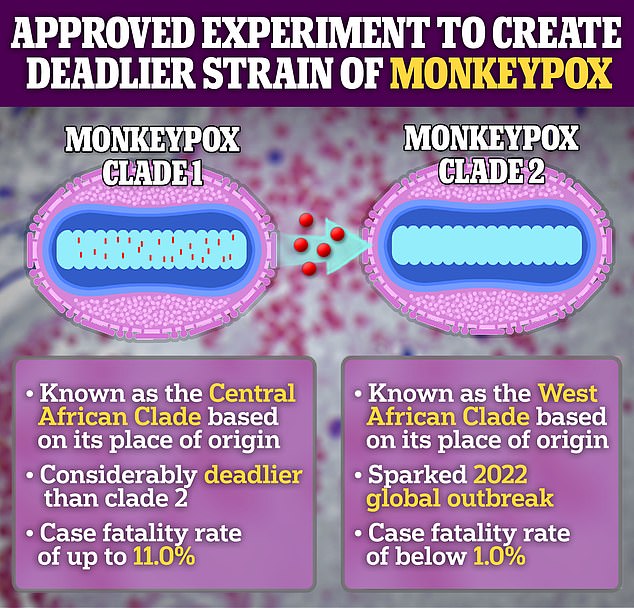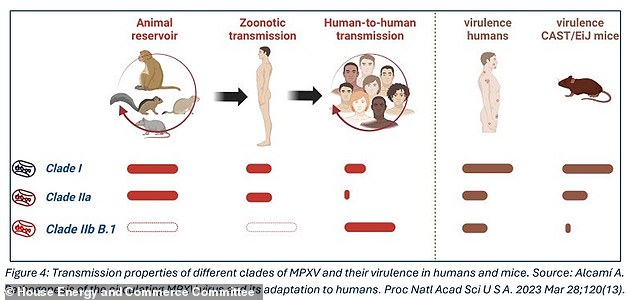Dr Anthony Fauci’s department hid plans to create mutant monkeypox virus that ‘could’ve started pandemic,’ bombshell Congress report finds
Dr. Anthony Fauci’s former department “misled” Congress with its plans to create a Frankenstein monkeypox virus that had pandemic potential, a new report says.
The National Institute of Allergy and Infectious Diseases (NIAID) submitted plans to create a more transmissible and deadlier variant of Mpox in 2015, when Dr. Fauci was still in charge of the agency.
The plans did not gain widespread attention until late 2022 – amid concerns that Covid may have emerged from similar experiments using US government subsidies in China.
The blueprint to create a mutated Mpox virus raised major concerns among experts and led to an investigation by the House Energy and Commerce Committee, which this week released the results of its year-and-a-half investigation.
The report said HHS, NIAID and NIH repeatedly “obstructed and misled the committee” about whether the risky experiments had been approved and conducted, describing their collaboration with the research as “unacceptable and potentially criminal.”
Fauci looks somberly at a congressional hearing earlier this month
Researchers added: “HHS and the NIH repeatedly told the committee that the experiments were not ‘formally proposed’ or ‘planned,’ had never been approved or conducted and are not currently under review.”
‘[These] repeated claims were false.”
They also said that NIAID, a division of the NIH, should not be trusted to conduct this type of research: “The most important conclusion drawn at this point in the investigation is that NIAID cannot be trusted to conduct responsible oversight to maintain its own research into pathogens.
“It cannot be relied upon to determine whether an experiment involving a potential pandemic pathogen or an enhanced potential pandemic pathogen poses an unacceptable biosecurity risk or a serious threat to public health.”
Monkeypox, which belongs to the same family of viruses as smallpox, causes rashes and flu-like symptoms and caused a global outbreak in 2022, infecting tens of thousands of people.
There are two types of monkeypox viruses: Clade I, which causes severe illness and has killed up to 11 percent of people in previous outbreaks, and Clad II, the type that caused the 2022 global outbreak. These infections are more transmissible but less serious. and almost 100 percent of people survive.
In October 2022, Dr. revealed Moss that a team of scientists wanted to insert genes from the more dangerous Clade I Mpox into Clade II, creating a hybrid strain that could have been both deadly and more contagious.
Researchers said this would be classified as gain-of-function, research that could result in deadlier and more transmissible viruses and is believed to be behind the creation of Covid-19.
It was estimated that the new Mpox virus would have had a mortality rate of up to 15 percent and a reproduction rate of 2.4 percent, meaning one sick person could infect more than two other people.
At this rate, the hybrid strain would have had pandemic potential.

In October 2022, Dr. Bernard Moss revealed that a team of scientists wanted to equip Clade II Mpox with genes from the more dangerous Clade I strain.
The report comes on the heels of Dr. Fauci’s recent testimony on the origins of Covid, which some government agencies believe was a risky gain-of-function study that took place in China and was funded by the US, including NIAID .
Dr. Fauci has maintained that his agency was not involved in GOF experiments in China, but the lack of transparency surrounding Mpox research calls into question the reliability of the word from HHS, NIH and NIAID.
Scientists said their experiments may have revealed how different genes make monkeypox deadlier and boost the development of better drugs and vaccines.
But the modified virus posed “an exceptionally high risk” to the public if it accidentally leaked, said Dr. Richard Ebright, a microbiologist at Rutgers University in New Jersey.
The Maryland team argued that their work did not involve “amplifying” a pathogen because they were trying to exchange natural mutations rather than create new ones, meaning the hybrid could not be more deadly than the existing clades.
But the news still shocked experts and Americans, who expressed concern that such research is still being conducted in the US, despite fears that similar practices may have caused the Covid pandemic.
Despite its approval, investigators claim the work was never done, but the report states that “HHS has repeatedly refused to provide documents supporting this claim.”

The above shows the different characteristics of the different types of monkeypox

The Maryland team’s work was led by NIAID scientist Dr. Bernard Moss at the agency’s headquarters in Bethesda (shown)
The research was approved by the NIH’s Institutional Biosafety Committee in June 2015 — seven years before the House Energy and Commerce Committee first inquired about the experiment.
The committee’s report states that while the project was approved, it is unknown whether the work ever took place, but because the research was greenlit, experiments could have been conducted anytime between 2015 and May 2023, when the NIH the approval was ‘effectively withdrawn’.
The committee is now seeking additional evidence from HHS, NIAID and the NIH to confirm that the risky experiments were never conducted.
Dr. Ebright told this website after the news first broke: ‘A laboratory-generated monkeypox virus… more deadly than and as transmissible as the monkeypox virus currently circulating in humans, would potentially negate vaccine protection and likely spread beyond the current risk area. populations to the general population.’
Monkeypox can spread through contact with infected animals or through close contact with an infected person. There is no FDA-approved treatment for Mpox, only therapies to manage symptoms, but there is a vaccine to protect against it.
An Mpox outbreak began in the US in May 2022 as part of a larger global outbreak arising from the Clade II strain endemic to West Africa.
The CDC reports that according to the most recent data available, there were 32,000 cases of monkeypox in the US as of January 2024, with 58 deaths. There have been 95,900 cases worldwide since the outbreak began.
While the commission began its investigation in October 2022, the agencies repeatedly declined to answer questions.
And lawmakers were only given documents to examine in March 2024 “after subpoena threats forced” the agencies to provide them, ultimately confirming that the experiments had been approved.
Following their findings, researchers recommended the creation of an oversight board to review NIAID-funded research on dangerous pathogens and move final approval for GOF research from NIAID to another entity.
